Husqvarna P 520D, P 525D User Manual

Operator′s manual
P520D
P525D
Please read the operator’s manual carefully and make sure you understand the instructions before using the machine.
English

CONTENTS
Contents |
|
....................................................Cleaning the air filter |
24 |
|
CONTENTS |
|
Replacing the air filter .................................................. |
24 |
|
|
Cleaning the engine and muffler |
24 |
||
Contents |
2 |
|||
Check the safety system |
25 |
|||
Service journal |
|
|||
|
Replacing the light bulbs |
25 |
||
Pre-delivery service |
3 |
|||
Main fuse |
25 |
|||
After the first 25 hours |
3 |
|||
Checking the tyre pressure |
25 |
|||
INTRODUCTION |
|
|||
|
Check the battery |
26 |
||
Dear Customer, ............................................................ |
4 |
|||
The Cutting Unit Components |
26 |
|||
Driving and transport on public roads |
4 |
|||
Fitting the cutting head |
26 |
|||
Towing |
4 |
|||
Removing the cutting unit |
27 |
|||
Use |
4 |
|||
Service position for the cutting unit |
28 |
|||
Good service |
5 |
|||
Placing in the service position |
28 |
|||
KEY TO SYMBOLS |
|
|||
|
Cutting height and tilt angle adjustment |
29 |
||
Symbols |
6 |
|||
Replacing the cutting unit belts |
30 |
|||
WHAT IS WHAT? |
|
|||
|
Checking the blades |
30 |
||
Location of the controls |
7 |
|||
Removing the BioClip plug |
30 |
|||
SAFETY INSTRUCTIONS |
|
|||
|
Adjustment of PTO belts |
31 |
||
Safety instructions |
8 |
|||
Change PTO belts |
31 |
|||
Driving on slopes |
9 |
|||
Change coolant |
32 |
|||
Children |
10 |
|||
Lubrication |
|
|||
Maintenance |
10 |
|
||
Lubrication schedule |
33 |
|||
Transport |
11 |
|||
General |
33 |
|||
PRESENTATION |
|
|||
|
Accessories |
34 |
||
Presentation |
12 |
|||
Pivot wheel bearings |
34 |
|||
Throttle trigger |
12 |
|||
The cutting unit bevel gear |
34 |
|||
Speed limiter |
12 |
|||
Universal drive shaft joints |
34 |
|||
Counter |
12 |
|||
Cutting unit bracket |
34 |
|||
Parking brake |
12 |
|||
Lift arm rear bearings |
34 |
|||
Cutting unit |
12 |
|||
Lift cylinder |
34 |
|||
Lever for hydraulic lift of attachments |
13 |
|||
The drive shaft front support bearing |
35 |
|||
Seat |
14 |
|||
The drive shaft rear support bearing |
35 |
|||
Fueling |
14 |
|||
Steering cylinder |
35 |
|||
Lights and power outlet |
14 |
|||
Joint bearing |
35 |
|||
Instrument panel |
15 |
|||
Link brace |
35 |
|||
Bypass valves |
15 |
|||
Checking the engine’s oil level |
35 |
|||
ROPS (Roll Over Protective Structure) |
16 |
|||
Changing the oil filter |
36 |
|||
Auxiliary lift system |
16 |
|||
Check the hydraulic system oil level |
36 |
|||
STARTING ENGINE |
|
|||
|
Check the oil level in the transmission gearboxes |
37 |
||
Before starting |
17 |
|||
Knobs for setting the cutting height |
37 |
|||
Start the engine |
17 |
|||
Driver seat |
37 |
|||
Starting the engine with a weak battery |
18 |
|||
Lubricating the cables |
37 |
|||
DRIVING |
|
|||
|
Throttle and choke cables, lever bearings |
37 |
||
Driving the Rider |
19 |
|||
Lubricate the parking brake wire |
37 |
|||
Braking |
19 |
|||
Troubleshooting schedule |
|
|||
Stop the engine |
19 |
|
||
ELECTRICAL SYSTEM |
|
|||
Cutting tips |
20 |
|
||
Wiring diagram |
41 |
|||
Maintenance |
|
|||
|
ELECTRICAL SYSTEM |
|
||
Maintenance schedule |
21 |
|
||
Wiring diagram |
47 |
|||
Cleaning |
22 |
|||
Storage |
|
|||
Removing of the machine hoods |
22 |
|
||
Winter storage |
53 |
|||
Checking the engine’s cooling air intake |
22 |
|||
Guard |
53 |
|||
Adjustment of pump and alternator belt |
23 |
|||
Service |
53 |
|||
Change pump and alternator belt |
23 |
|||
TECHNICAL DATA |
|
|||
Inspecting the muffler |
23 |
|
||
EC-declaration of conformity |
55 |
|||
Adjusting the parking brake |
23 |
|||
|
|
|||
Replacement of fuel filter ............................................. |
23 |
|
|
|
|
|
|
|
2 – English

Service journal
Pre-delivery service
1Charge the battery for at least 4 hours at max. 3 amp.
2Check coolant level and antifreeze.
3Check and adjust tyre pressure (150 kPa, 1,5 bar, 21,8 PSI).
4Make sure the correct amount of oil is in the cutting unit's bevel gear.
5Check that the right amount of oil is in the engine.
6Check that there is oil in the transmission’s oil tank.
7Fit cutting unit.
8Adjust cutting unit:
Adjust cutting unit so that rear edge is about 6-9 mm higher than front edge.
9Lubricate the universal drive shaft with grease.
10Connect battery.
11Fill with fuel and start engine.
12Check that machine does not move in neutral.
13Check: Forward drive.
Reverse drive.
Operation of blades.
Seat safety switch.
Safety switch for parking brake.
14Tell customer about:
The requirement and advantages of servicing the machine according to the service plan
Servicing and the influence of this journal on the second-hand value of the machine.
The transmission guarantee is only valid if the synchronisation of the front and rear wheels has been checked and adjusted in compliance with
the service schedule. The system will be damaged if synchronisation is not carried out.
At temperatures below 0 ° C, the machine must be warmed up for at least 10 minutes for the hydraulic oil and transmission to get hot.
Otherwise there is a risk of the transmission breaking down thereby reducing the service life of the transmission.
Range of applications for BioClip.
Complete proof of sale etc.
Pre-delivery service carried out. No outstanding problems. Certified:
______________________________________________
Date, mileage, stamp, signature
After the first 25 hours
1 Change the engine oil and oil filter
2 Change the transmission oil and oil filter
3Check the synchronisation between the front and rear wheels.
English – 3
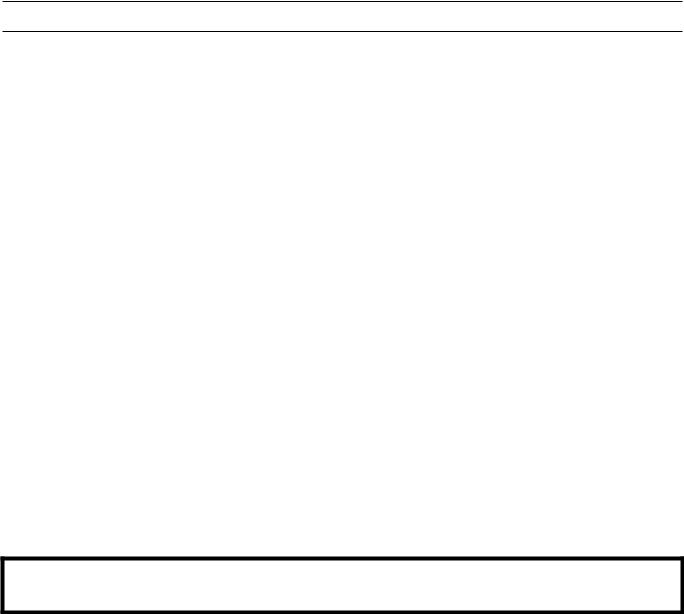
INTRODUCTION
Dear Customer,
Thank you for choosing a Husqvarna Rider. Husqvarna Riders are built to a unique design with a front-mounted cutting unit and a patented articulated steering. Riders are designed for maximum efficiency even in small or confined areas. The closely grouped controls and pedal-operated hydrostatic transmission also contribute to the performance of this machine.
This operator’s manual is a valuable document. By following its instructions (on operation, service, maintenance, etc.) you will significantly extend the life of the machine and even its second-hand value.
When you sell your Rider, make sure you pass on the operator’s manual to the new owner.
The last chapter in the operator’s manual consists of a Service Journal. Make sure that all service work and repairs are recorded. A well-documented service history reduces the costs of seasonal maintenance and influences the second-hand value of the machine. Bring the operator’s manual with the Rider when bringing it to a workshop for service procedures.
Driving and transport on public roads
Check the relevant road traffic regulations before driving the machine on a public road. If transporting the machine on another vehicle always use approved securing devices and make sure that the machine is securely held.
Towing
When your machine is equipped with a hydrostatic transmission you should only tow the machine over short distances and at a low speed, otherwise there is a risk of damaging the transmission.
The transmission must be disengaged when towing, see instructions under the heading Bypass valves.
Use
This ride-on mower is designed to mow grass on open and level ground surfaces. In addition, there is a number of accessories recommended by the manufacturer that broadens the application area. Please contact your dealer for more information about which accessories are available. The machine may only be used with the equipment recommended by the manufacturer. All other types of use are incorrect. Compliance with and strict adherence to the conditions of operation, service and repair as specified by the manufacturer also constitute essential elements of the intended use.
IMPORTANT INFORMATION The transmission guarantee is only valid if the synchronisation of the front and rear wheels has been checked and adjusted in compliance with the service schedule. The system will be damaged if synchronisation is not carried out.
This machine should be operated, serviced and repaired only by persons who are familiar with its particular characteristics and who are acquainted with the relevant safety procedures.
Accident prevention regulations, all other generally recognised regulations on safety and occupational medicine, and all road traffic regulations must be observed at all times.
Any arbitrary modifications carried out to this machine may relieve the manufacturer of liability for any resulting damage or injury.
4 – English

INTRODUCTION
Good service
Husqvarna products are sold all over the world and ensures that you, the customer, get the best support and service. For example, before this machine was delivered it was inspected and adjusted by your dealer. See the certificate in the Service Journal in this manual.
When you need spare parts or advice on service issues, warranty terms, etc., contact:
|
|
|
This Operator’s Manual belongs to machine with |
Engine |
Transmission |
serial number: |
|
|
|
|
|
On the machine's rating plate you will find the following information:
•The machines type designation.
•The manufacturer’s type number.
•The machine’s serial number.
State the type designation and serial number when ordering spare parts.
English – 5
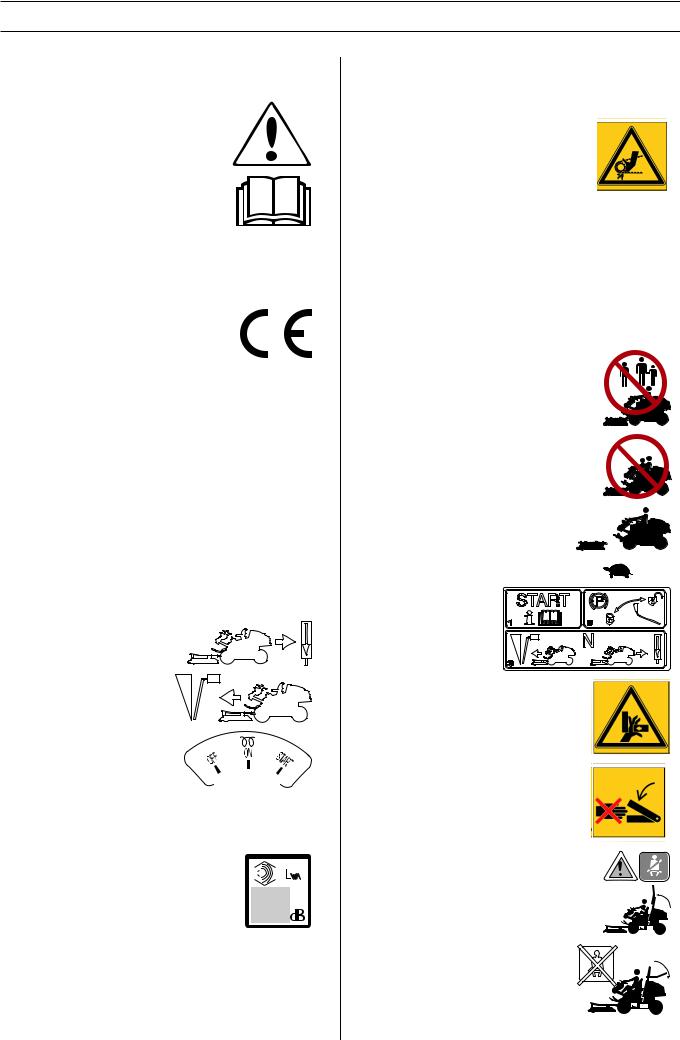
KEY TO SYMBOLS
Symbols
These symbols are on the machine and in the instructions.
WARNING! Careless or incorrect use can result in serious or fatal injury to the operator or others.
Please read the operator’s manual carefully and make sure you understand the instructions before using the machine.
Always wear:
•Approved hearing protection
This product is in accordance with applicable EC directives.
Fast
Slow
Stop the engine.
Fuel
Oil pressure
Backwards
Forwards
Ignition
Parking brake
Noise emission to the environment according to the European Community’s Directive. The machine’s emission is specified in the Technical data chapter and on the label.
Connecting the power take-off (PTO).
Disengaging the power take-off (PTO)
6 – English
Warning: rotating parts. Keep hands and feet clear.
Watch your hands and other body parts so they do not get caught and crushed between the belt and belt pulley.
Rotary blades Keep hands and feet away from under the hood when the engine is running
Never drive across a slope
Never use the machine if persons, especially children, or animals, are in the vicinity
Never carry passengers on the machine or equipment
Drive very slowly if no cutting unit is fitted
Starting instructions
Risk of crush injuries!
Danger of crushing between the lift arms and base plate.
If the frame is folded up, the safety belt must be used.
If the frame is folded down the safety belt should NOT be used.
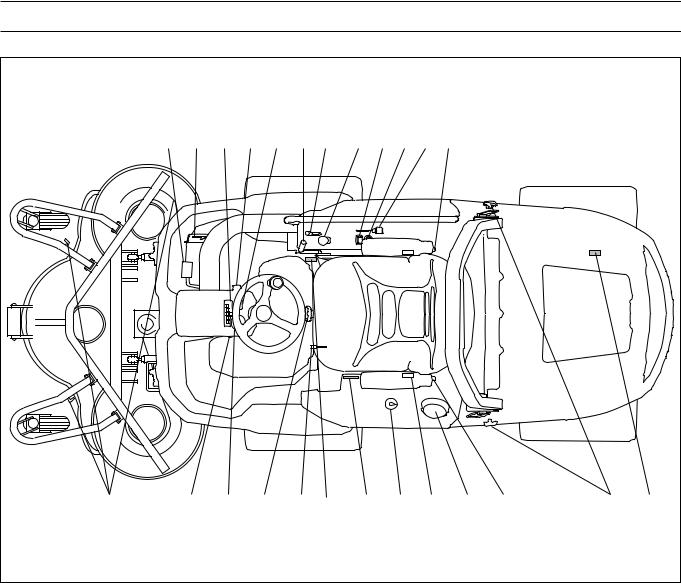
WHAT IS WHAT?
|
12 11 10 |
9 |
8 |
7 6 |
5 |
4 3 2 |
1 |
|
|
|
|
||
13 |
14 |
15 |
16 |
17 18 |
19 |
20 |
21 |
22 |
23 |
24 |
25 |
||
Location of the controls
1 |
Knob for seatback angle |
14 |
Counter |
2 |
Throttle trigger |
15 |
Temperature gauge |
3 |
Power outlet |
16 |
Knob for adjustment of the seat suspension |
4 |
Switch for the power outlet |
17 |
Lever for longitudinal seat adjustment |
5 |
Control for cutting unit drive |
18 |
Bypass valve front axle |
6 |
Lever for hydraulic lift of attachments |
19 |
Product and serial number plate |
7 |
Parking brake |
20 |
Fuel gauge |
8 |
Switch for the lights |
21 |
Catch for lowering seat |
9 |
Ignition lock |
22 |
Fuel cap |
10 |
Instrument panel |
23 |
Knob for lumbar support |
11 |
Speed limiter for reversing |
24 |
Cover lock |
12 |
Speed limiter for driving forward |
25 |
Bypass valve rear axle |
13 |
Adjusting the cutting height |
|
|
English – 7
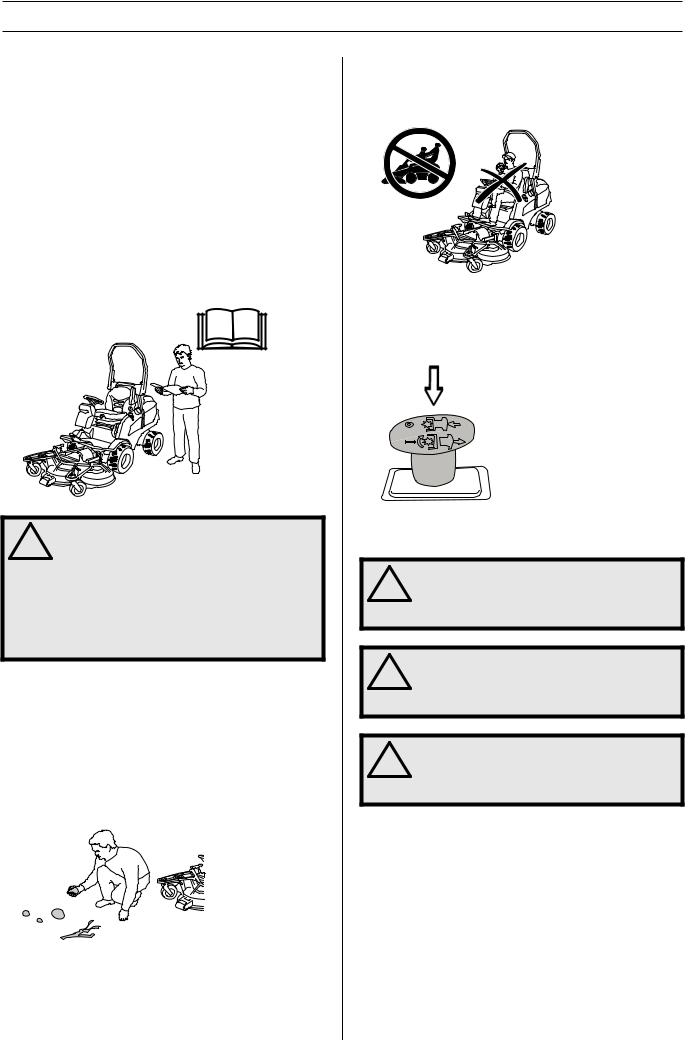
SAFETY INSTRUCTIONS
Safety instructions
These instructions are for your safety. Read them carefully.
Insure your Rider
•Check the insurance coverage for your new Rider.
•Contact your insurance company.
•You should have fully comprehensive insurance including: third party, fire, damage, theft and liability
General use
•Read all the instructions in this operator’s manual and on the machine before you start it. Ensure you understand them and then observe them.
WARNING! This machine produces an
!electromagnetic field during operation. This field may under some circumstances interfere with active or passive medical implants. To reduce the risk of serious or fatal injury, we recommend persons with medical implants to consult their physician and the medical implant manufacturer before operating this machine.
•Learn how to use the machine and its controls safely and learn to how to stop quickly. Also learn to recognize the safety decals.
•Only allow the machine to be used by adults who are familiar with its use.
•Make sure nobody else is in the vicinity of the machine when you start the engine, engage the drive or drive off.
•Clear the area of objects such as stones, toys, wires, etc. that may become caught in the blades and be thrown out.
•Look out for the ejector and do not direct it towards anyone.
•Stop the engine and prevent it from starting before you clean the cutting unit.
8 – English
•Remember that the driver is responsible for dangers or accidents.
•Never carry passengers. The machine is only intended to be used by one person.
•Always look downwards and backwards before and while reversing. Keep watch for both large and small obstacles.
•Slow before cornering.
•Switch off the blades when you are not mowing.
•Take care when rounding a fixed object, so that the blades do not hit it. Never run the machine over foreign objects.
! |
WARNING! This machine can sever hands |
and feet as well as throw objects. Failure to |
|
observe the safety instructions can result in |
|
|
serious injuries. |
! |
WARNING! The inside of the muffler contain |
chemicals that may be carcinogenic. Avoid |
|
contact with these elements in the event of a |
|
|
damaged muffler. |
! |
WARNING! The engine emits carbon |
monoxide, which is a colourless, poisonous |
|
gas. Do not use the machine in enclosed |
|
|
spaces. |
•Only use the machine in daylight or in other well-lit conditions. Keep the machine at a safe distance from holes or other irregularities in the ground. Pay attention to other possible risks.
•Never use the machine if you are tired, if you have consumed alcohol, or if you are taking other drugs or medication that can affect your vision, judgement or coordination.
•Keep an eye on the traffic when working close to a road or when crossing it.
•Never leave the machine unsupervised with the engine running. Always stop the blades, apply the parking brake, stop the engine and remove the keys before leaving the machine.

SAFETY INSTRUCTIONS
•Never allow children or other persons not trained in the use of the machine to use or service it. Local laws may regulate the age of the user.
WARNING! You must use approved personal
!protective equipment whenever you use the machine. Personal protective equipment cannot eliminate the risk of injury but it will reduce the degree of injury if an accident does happen. Ask your dealer for help in choosing the right equipment.
•Use hearing protection to minimise the risk of hearing impairment.
•Never wear loose-fitting clothing, jewellery or similar that can get caught in moving parts.
•Never use the machine when barefoot. Always wear protective shoes or protective boots, preferably with steel toes.
•Make sure that you have first aid equipment close at hand when using the machine.
Driving on slopes
Driving on slopes is one of the operations where the risk of the driver losing control of the machine or of it overturning is the greatest; this can result in serious injury or death. All slopes demand extra care. If you cannot reverse up a slope or if you feel unsure, do not mow it.
IMPORTANT INFORMATION
Do not drive down slopes with the unit raised.
This is what you do
•Remove obstacles such as stones, branches, etc.
•Mow upwards and downwards, not sideways.
•Do not use the machine on ground that slopes more than 10°.
•Take extra care if any attachments are fitted that can change the stability of the machine.
•Avoid starting or stopping on a slope. If the tyres start to slip, stop the blades and drive slowly down the slope.
•Always drive smoothly and slowly on slopes.
•Always use ROPS (Rollover Protective Structure) and seat belts when riding on slopes.
•Do not make any sudden changes in speed or direction.
•Avoid unnecessary turns on slopes, if necessary, turn slowly and gradually downwards if possible. Drive slowly. Do not turn the wheel sharply.
•Watch out for and avoid driving over furrows, holes and bumps. It is easier for the machine to overturn on uneven ground. Tall grass can hide obstacles.
•Do not mow too close to edges, ditches or banks. The machine can suddenly overturn if one wheel comes over the edge of a steep slope or a ditch, or if an edge gives way.
•Do not mow wet grass. It is slippery, and tyres can lose their grip so that the machine skids.
•Do not try to stabilize the machine by putting your foot on the ground.
•When cleaning the chassis, the machine may never be driven near verges or ditches.
•When mowing, keep away from bushes and other objects.
•Follow the manufacturer’s recommendations regarding wheel weights or counterbalance weights to increase machine stability.
IMPORTANT INFORMATION
Some combinations of accessories require additional counterweight at the rear Check with your dealer for the right combination.
English – 9
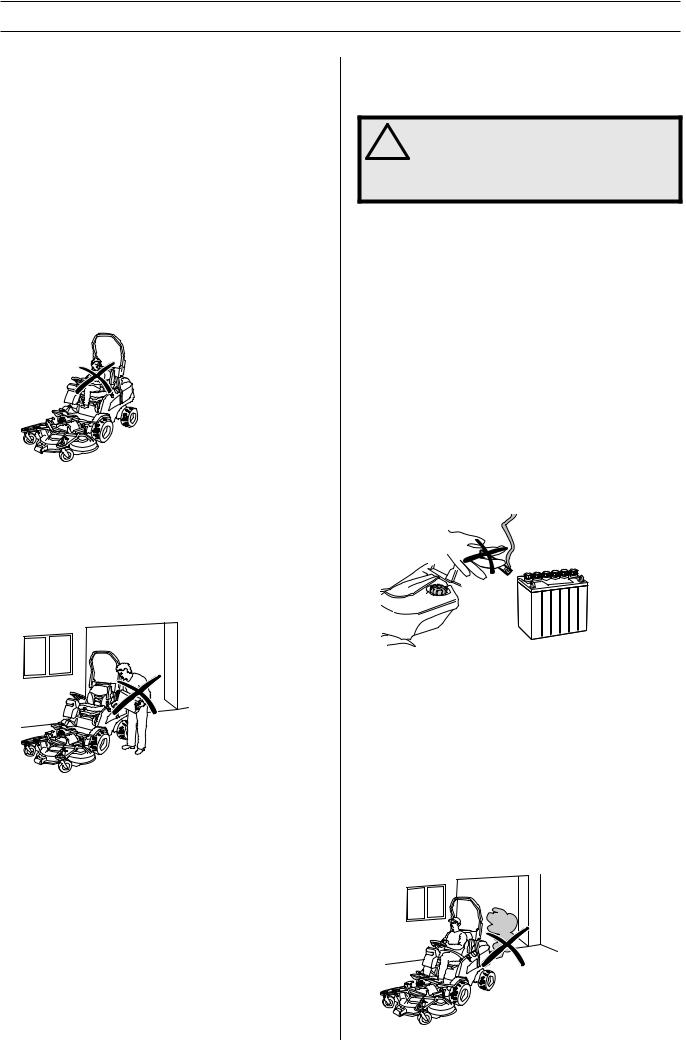
SAFETY INSTRUCTIONS
Children
•Serious accidents may occur if you fail to be on your guard for children in the vicinity of the machine. Children are often attracted to the machine and mowing. Never assume that children will remain where you last saw them.
•Keep children away from the area to be mowed and under close supervision by another adult.
•Keep an eye out and shut off the machine if children enter the work area.
•Before and during reversing procedures, look behind you and down for small children.
•Never allow children to ride along. They can fall off and seriously injure themselves or be in the way for safe manoeuvring of the machine.
•Never allow children to operate the machine.
•Be particularly careful near corners, bushes, trees or other objects that block your view.
Maintenance
•Stop the engine. Prevent the engine from starting by removing the ignition key before making any adjustments or performing maintenance.
•Never fill the fuel tank indoors.
•Fuel and fuel vapour are poisonous and highly flammable. Be especially careful when handling petrol and engine oil, as carelessness can result in personal injury or fire.
•Only store fuel in containers approved for the purpose.
•Never remove the fuel cap and fill the fuel tank when the engine is running.
•Allow the engine to cool before refuelling. Do not smoke. Do not fill with fuel in the vicinity of sparks or naked flames.
•Handle oil, oil filters, fuel and the battery carefully, of environmental considerations. Follow the local recycling requirements.
•Electrical shocks can cause injuries. Do not touch cables when the engine is running. Do not test the ignition system with your fingers.
! |
WARNING! The engine and the exhaust |
system become very hot during operation. |
|
Risk of burn injuries if touched. When |
|
|
mowing, keep away from bushes and other |
|
materials in order to avoid a heating effect. |
•If leaks arise in the fuel system, the engine must not be started until the problem has been resolved.
•Store the machine and fuel in such a way that there is no risk that leaking fuel or fumes can cause any damage.
•Check the fuel level before each use and leave space for the fuel to expand, because the heat from the engine and the sun may otherwise cause the fuel to expand and overflow.
•Avoid overfilling. If you spill petrol on the machine, wipe up the spill and wait until it has evaporated before starting the engine. If you spill on your clothing, change your clothing.
•Allow the machine to cool before performing any actions in the engine compartment.
•Take care with battery maintenance. Explosive gases form in the battery. Never perform maintenance on the battery while smoking or in the vicinity of open flames or sparks. This can cause the battery to explode and cause serious injuries.
•Make sure all nuts and bolts are tightened correctly and that the equipment is in good condition.
•Do not modify safety equipment. Check regularly to be sure it works properly. The machine must not be driven if protective plates, protective covers, safety switches or other protective devices are not fitted or are defective.
•Observe the risk of injury caused by moving or hot parts if the engine is started with the engine cover open or protective cowlings removed.
•Never use the machine indoors or in spaces lacking proper ventilation. Exhaust fumes contain carbon monoxide, an odourless, poisonous and highly dangerous gas.
10 – English

SAFETY INSTRUCTIONS
•Stop and inspect the equipment if you run over or into anything. If necessary, make repairs before starting.
•Never make adjustments with the engine running.
•The machine is tested and approved only with the equipment originally provided or recommended by the manufacturer.
•The blades are sharp and can cause cuts. Wrap the blades or wear protective gloves when handling them.
•Check regularly that the parking brake works. Adjust and maintain as required.
•Reduce the risk of fire by removing grass, leaves and other debris that may have fastened on the machine. Allow the machine to cool before putting it in storage.
Transport
IMPORTANT INFORMATION
The parking brake is not sufficient to lock the machine during transport. Ensure you secure the machine firmly to the transporting vehicle.
•The machine is heavy and can cause serious crush injuries. Take extra care when loading it onto or off a vehicle or trailer.
•Use an approved trailer to transport the machine.
•To secure the machine on the trailer, two approved tension belts and four wedge shaped wheel blocks should be used.
Engage the parking brake and tie the tension belts around the front and rear brackets.
Secure the machine by tensioning the belts towards the back and the front of the trailer respectively.
Place the wheel blocks in front of and behind the rear wheels.
•Check and observe local road traffic regulations before transporting or driving the machine on roads.
English – 11
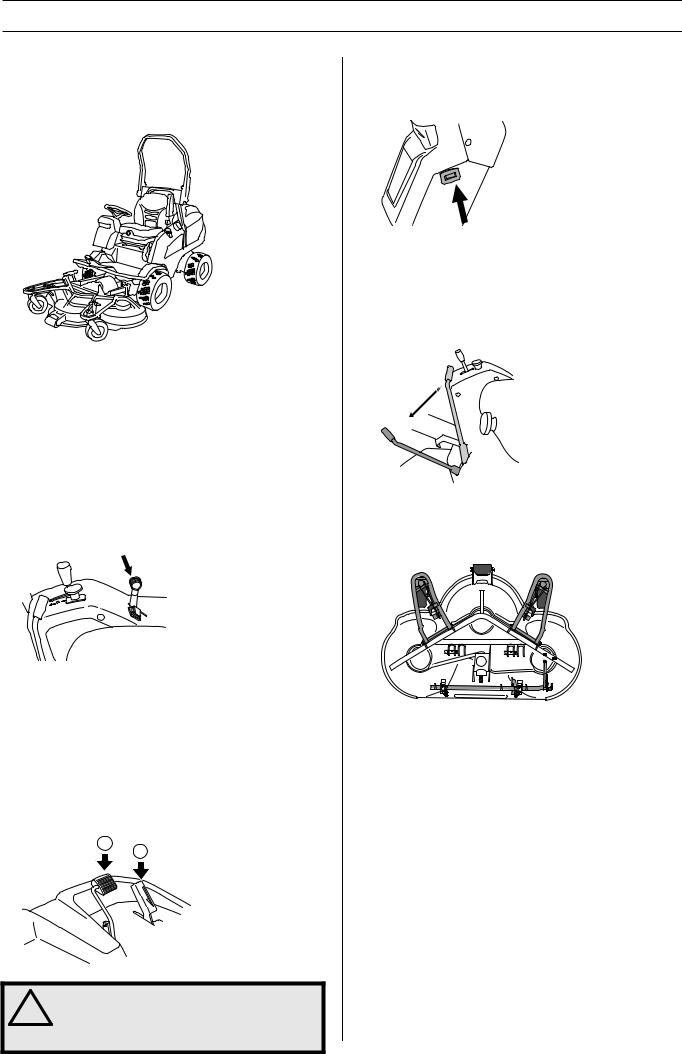
PRESENTATION
Presentation
Congratulations on your choice of an excellent quality product that will give you great pleasure for many years. This operator’s manual describes P 520D and P 525D.
P 520D and P 525D are equipped with hydraulic steering and an equipment hoist.
The machines are equipped with four wheel drive.
The power transmission from the engine is handled by a hydrostatic transmission, which allows variable variation of the speed by using the pedals. One pedal for driving forward and one for reverse.
Throttle trigger
The throttle control regulates the engine speed, and thereby also the rotation speed of the blades.
To increase or reduce the engine speed the control is moved forwards or backwards.
When driving the throttle control must be in the position for maximum engine speed, work mode.
Speed limiter
The speed of the machine is steplessly regulated with two pedals. Pedal (1) is used to drive forwards, and pedal (2) to drive backwards.
1
2
WARNING! Make sure that branches do not
!obstruct the pedals when mowing under bushes. Otherwise there is a risk you may lose control.
Counter
The chronometer shows how many hours the engine has been running.
Any time when the engine is not running but the ignition is switched on is not registered.The last digit shows tenths of an hour (6 minutes).
Parking brake
Operate the parking brake by moving the handle forwards.
Cutting unit
P 520D and P 525D can be equipped with two different cutting units.
•Combi 132
•Combi 155
The Combi-unit, equipped with a BioClip-plug, finely chops the cuttings to fertiliser. Without the BioClip-plug the unit works in the same way as a rear ejection unit.The rear ejector ejects the clippings behind the unit without finely chopping them.
12 – English
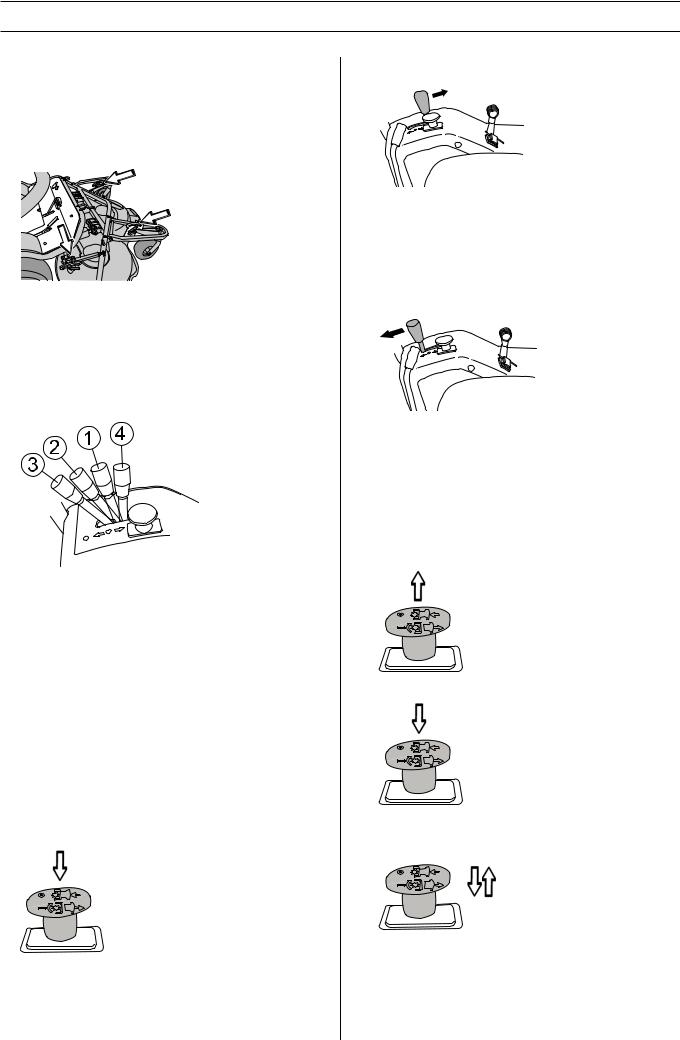
PRESENTATION
Adjusting the cutting height
The cutting height can be adjusted to seven different positions.
Select the required cutting height (1-7) using the cutting height adjusters. Set the knobs horizontally so that they do not snag on bushes and the like.
Lever for hydraulic lift of attachments
The lifting lever is used to put the cutting unit in either the transport or mowing position when hydraulic pressure is available.
The lever has four different positions.
•Position 1 is the neutral position.
•Position 2 lowers the cutting unit with spring return to the neutral position
•Position 3 is floating where the lever stops. The unit is lowered to the automatically floating position, which means that the cutting unit follows the contours of the ground.
•Position 4 raises the cutting unit with spring return to neutral position.
When cutting the lever should be set directly to the floating position (3).
Lifting the Cutting Unit (Transport
Position)
Stop the blades by pressing the stop button.
Pull the lever backwards to engage the transport position.The unit is then raised.
The cutting unit can be raised slightly with the blades rotating. This is to facilitate the mowing of extremely tall grass or uneven surfaces.
Lowering the Unit (Mowing Position)
Move the hydraulic lifting lever forwards to engage the cutting position.
When cutting the lever should be set directly to the floating position (3).
Controls for operating the cutting unit blades
The cutting unit can be started only when the driver is sitting in the seat.
•Pull out the lever to engage the drive of the blades.
•Push in the lever to disengage the blades.
When the safety circuit has stopped the drive to the cutting unit, the control must be pushed and pulled out again to start the blades.
The safety circuit is triggered and the cutting unit is stopped in the following cases:
•When the driver leaves the seat with the blades engaged. There is a short delay to prevent stopping if the driver bounces on the seat.
English – 13
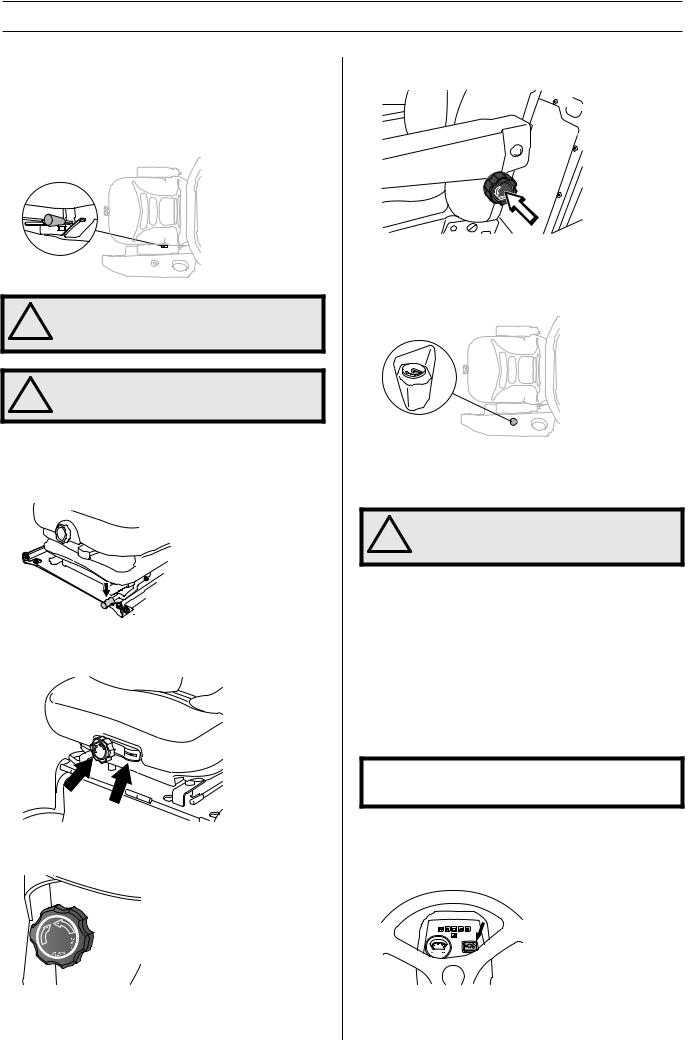
PRESENTATION
Seat
The seat has a jointed attachment on the front edge and can be tipped forward.
To fold the seat forward, the latch for the seat must be operated.
WARNING! Take care so that hands are not
!trapped or injured by the locking hooks when the seat is folded back.
WARNING! Do not adjust seat settings while
!driving. Risk of unsafe manoeuvring.
The seat can also be adjusted lengthways.
•When making adjustments, the lever under the front edge of the seat is moved up, after which the seat can be moved backwards or forwards to the desired position.
•The seat suspension can be adjusted to driver's weight. The weight is adjusted by turning the knob under the front edge of the seat .
On the sides of the backrest are two knobs:
•Seatback angle is adjusted with the knob on the right side.
•The lumbar support is adjusted with the knob on the left side of seat back .
Fueling
The fuel level in the tank is shown by the gauge on top of the tank.
Fill with diesel fuel. Petrol must not be used under any circumstances. Use fuel with a cetane rating over 45. Max RME mixing 5% in mineral oil-based fuels.
! |
WARNING! Diesel is highly flammable. |
Exercise care and refuel outdoors (see |
|
safety instructions). |
The diesel engine injection system is very sensitive and can be damaged by the slightest contamination. Observe the greatest possible fuel cleanliness. Use only clean containers.
Clean the area around the fuel cap. Contamination in the tank can cause operating problems.
If you have spilt fuel on yourself or your clothes, change your clothes. Wash any part of your body that has come in contact with fuel. Use soap and water.
Wipe up any spillage. Materials contaminated by fuel must be moved to a safe location.
IMPORTANT!
Do not use the fuel tank as a support area.
Lights and power outlet
The lights are switched on and off using the switch on the instrument panel.
A seat heater or mobile phone charger are examples of articles that can be connected to the power socket.
14 – English

PRESENTATION
The power outlet is switched on and off using power switch on the control panel.
The power outlet works even if the ignition is turned off. Do not forget to disconnect the power outlet or remove the power consumer when the machine is not in use.
The voltage is 12 V.
The power outlet is fuse protected by its own fuse. The fuse for the power outlet is placed in the electrical connection box, behind the side plate on the control panel.
Instrument panel
The indicator lights are on the steering console under the steering wheel.
1 |
2 |
3 |
4 |
5 |
6 |
7
 8
8
1Temperature gauge for coolant. The engine is liquid cooled. If overheating of the engine is indicated the first action to take is to reduce the engine temperature by running the engine at idle with no load. Turn off the power transmission
Check coolant level and top up if necessary. Also check that the radiator grill and radiator are clean and not clogged. The grill is at the rear of the machine and on top of the bonnet.
2Oil pressure, check oil level and top up if necessary.
3Ignition
4Battery charging
5Power transmission connected
6Parking brake
7Spotlight
8Switch for the lights
Bypass valves
Hydraulic pressure must be released in order for the ride-on mower to be moved when the engine is shutoff.
The hydraulic pressure is opened and closed with a bypass valve.
If you try to drive the machine without hydraulic pressure, it will not move. The drive on the axle is disengaged if one valve is open.
The P 520D and theP 525D has two valves, one valve for the front axle and one for the rear axle.
IMPORTANT! Always drive the machine with both valves closed.
•Bypass valve rear axle
- The hydraulic pressure is released by opening the locking nut (1) 1/4-1/2 turn anti-clockwise, then the bypass valve (2)
2turns.
-The hydraulic pressure is switched on by closing the valve. Close the valve nut (2) fully before tightening the locking nut
(1).
•Bypass valve front axle
- The hydraulic pressure is released by opening the locking nut (1) 1/4-1/2 turn anti-clockwise, then the bypass valve (2)
2turns.
-The hydraulic pressure is switched on by closing the valve. Close the valve nut (2) fully before tightening the locking nut
(1).
English – 15

PRESENTATION
ROPS (Roll Over Protective
Structure)
ROPS is a protective frame that reduces the risk of injury in the event of overturning. Use ROPS and a safety belt when driving on slopes.
The frame can be folded down. Remove the two pins that hold the frame and fold it backwards.
If the frame is folded down the safety belt should NOT be used.
If the frame is folded up, the safety belt must be used.
When the safety belt is not used, it must be wrapped around the chair back and tightened.
Auxiliary lift system
The auxiliary lift system transfers the weight of the cutting unit pivot wheel to the machine's front wheel.
The effect of the auxiliary lift system can be adjusted by moving the gas spring up or down.
Maximum effect is obtained when the gas spring is placed in the top hole.
No effect is obtained in the slot at the bottom.
When using the cutting unit, the gas spring must be mounted in the top hole.
16 – English
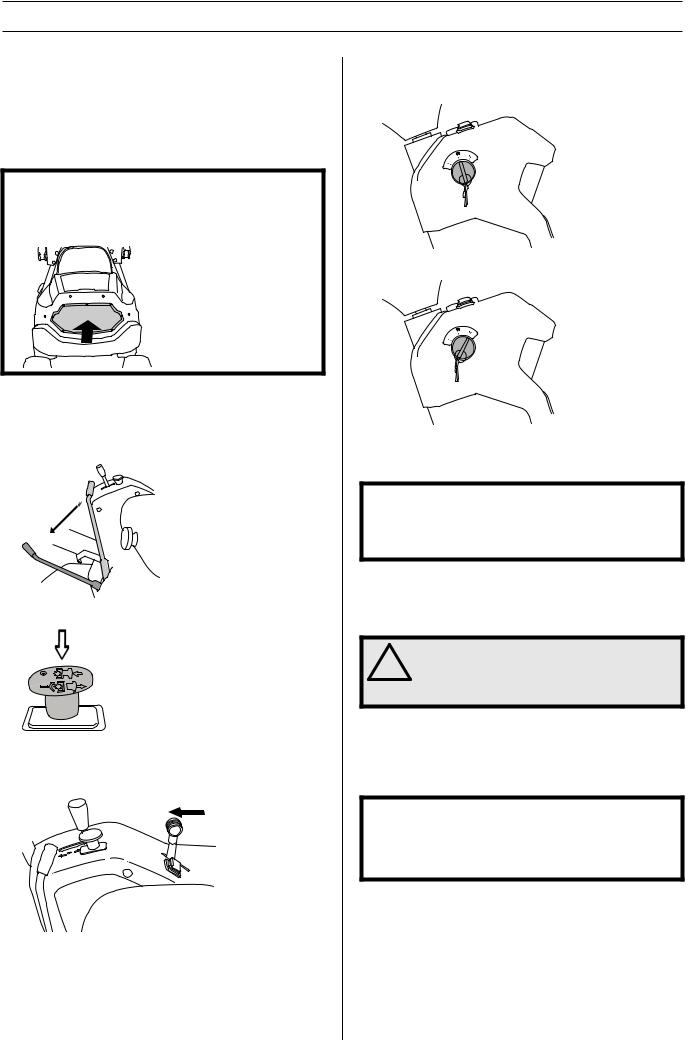
STARTING ENGINE
Before starting
•Read the safety instructions and information concerning the placement of controls and functions before starting.
•Perform daily maintenance before starting as set out in the Maintenance schedule.
IMPORTANT INFORMATION
The air intake grille in the engine cover must not be blocked by, for example, clothing, leaves, grass or dirt. Impaired cooling of the engine. Risk of major engine damage.
Start the engine
1Ensure that the bypass valves are closed.
2Apply the parking brake.
3 Push the PTO switch down (blades off).
The engine will not start unless the parking brake is on and the PTO switch is pressed
4 Move the throttle control to half throttle.
5Turn the ignition key to the ignition position and hold it there until the indicator light on the instrument panel goes out.
6 Turn the ignition key to the start position.
7When the engine starts release the ignition key immediately back to neutral position.
IMPORTANT INFORMATION
Do not run the starter for more than about 15 seconds at a time. If the engine does not start, wait about 15 seconds before trying again.
8Set the required engine speed with the throttle control.
Let the engine run at moderate speed or half throttle for 3- 5 minutes before subjecting it to heavy load.
! |
WARNING! Never run the engine indoors, in |
enclosed or poorly ventilated areas. The |
|
exhaust fumes contain toxic carbon |
|
|
monoxide. |
Starting and driving when cold
If the engine fails to start due to the cold, repeat ignition and attempt to re-start. Start gas or ether must not be used.
IMPORTANT! At temperatures below 0 ° C, the machine must be warmed up for at least 10 minutes for the hydraulic oil and transmission to get hot. Otherwise there is a risk of the transmission breaking down thereby reducing the service life of the transmission.
Winter fuel
When driving in very cold weather operating problems due to paraffin precipitation can occur if you run on standard fuel. To counteract this, winter fuel is sold in the climate areas affected. In some regions, different fuel is sold in summer and winter. Ask your fuel supplier and use only winter fuel below 0°C (+32°F).
English – 17
